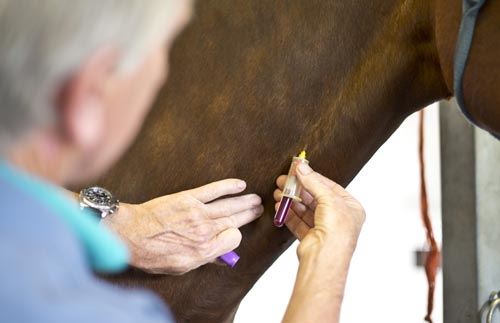By Jen Roytz
It’s hard to believe it’s that time of year again. Spring. That means spring cleaning, springing forward with our clocks and, of course, spring vaccinations for our horses.

Core vaccinations are simply vaccinations against diseases that are the most common risks to our horses’ health in their given region, pose the most significant risk to a horse’s health if infected and/or are required by law. According to the American Veterinary Medical Association (AVMA) and the American Association of Equine Practitioners (AAEP), core vaccines include the following:
-
Eastern/Western Equine Encephalomyelitis
-
Rabies
-
Tetanus
-
West Nile Virus
Vaccinations for additional diseases can be given on a risk-based, as-needed basis. This means that the disease might be prevalent in your area; there has been a recent outbreak or history of outbreaks in your area or an area in which you ship; or that your horse has shown previous susceptibility to a specific disease. Risk-based vaccinations include, but are not limited to:
-
Equine Herpesvirus (EHV)
-
Influenza
-
Streptococcus equi (Strangles)
-
Rotovirus
-
Potomac Horse Fever (PHF)
Information on risk-based vaccination types and schedules can be found at http://www.aaep.org/custdocs/AdultVaccinationChart.pdf?osCsid=bnlmf3d1ou3j3dpfvppdj713i0
Of significant interest to many horse owners, especially those who ride in or stable their horses near forests, tall grass or particularly dense brush is Lyme disease. Just as with humans, horses can contract the disease from the bite of an infected tick. Also as with humans, the disease can have severe effects on horses.
While the bulls-eye pattern seen in humans at the site of a tick bite to signify Lyme disease isn’t visible in horses, there are signs to look for. Not all horses will show signs of infection, those that do may present initial clinical signs that mirror those of other diseases, including low-grade fever, lethargy, undiagnosed sporadic lameness, swollen joints, neck or back pain and weight loss, tests can be done to diagnose whether or not the cause is Lyme disease, as well as whether it is in the early or chronic stages of the infection.
If a horse is infected with Lyme disease, a one to two month round of antibiotics will be prescribed. If left untreated, the disease can significantly impact a horse’s organ and neurological health.
Currently, there is not an approved vaccine for horses for Lyme disease. Some veterinarians use the commercially available canine vaccine for Lyme disease for their equine clients.
Prevention is a horse’s (and horse owner’s) best protection against the disease. Owners should use insect repellent (those based on Permethrin or Pyrethrin have shown particular efficacy) and should check their horses for ticks regularly, especially under the mane, under the tail, and on their throat, ears and stomach.
